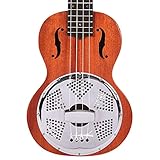The Ukulele resonator ukulele and plastic body resonator ukulele are two popular types of resonator ukuleles that offer unique sound and versatility for musicians. Resonator ukuleles, also known as “resophonic” ukuleles, utilize a metal cone or diaphragm to produce a louder and more distinct sound compared to traditional ukuleles. The resonator ukulele has a rich history, originally designed in the 1920s to amplify sound in Hawaiian music and has since become a staple in various musical genres.
The plastic body resonator ukulele, on the other hand, is a more modern variation of the traditional resonator ukulele. It is constructed with a plastic body, which provides a durable and lightweight alternative to the metal-bodied resonator ukulele. The use of plastic also allows for a more affordable option while maintaining the distinctive resonator sound. As a result, plastic body resonator ukuleles have gained popularity among beginner and traveling musicians seeking a reliable and cost-effective instrument.
Both the Ukulele resonator ukulele and plastic body resonator ukulele offer unique advantages and are well-suited for different musical preferences and playing styles. Professional musicians and enthusiasts have embraced the resonator ukulele for its projection and distinct tone, while the plastic body resonator ukulele provides a practical and accessible option for beginners and musicians on the go. Whether it’s for traditional Hawaiian music, blues, folk, or contemporary genres, the resonator ukulele’s versatility continues to make it a valuable addition to any musician’s collection.
What are the differences between Ukulele resonator ukulele and plastic body resonator ukulele?
When it comes to choosing a resonator ukulele, there are a few important factors to consider. The materials used in the construction can have a significant impact on the sound and performance of the instrument. Two popular options are Ukuleles with a traditional resonator design and those with a plastic body. Each type has its own unique qualities and advantages, so it’s essential to understand the differences before making a decision. In the following sections, we will delve deeper into the characteristics of these two types of resonator ukuleles to help you make an informed choice.
Construction
When comparing ukulele resonator ukuleles to plastic body resonator ukuleles, the first aspect to consider is their construction. Ukulele resonator ukuleles typically feature a metal resonator cone, which is responsible for producing a louder and more vibrant sound. On the other hand, plastic body resonator ukuleles are often constructed with a plastic body, which may not produce the same level of resonance and projection as a metal resonator cone.
Tone
The tone produced by ukulele resonator ukuleles and plastic body resonator ukuleles differs significantly. Ukulele resonator ukuleles are known for producing a bright, clear, and punchy tone, making them ideal for genres such as blues and bluegrass. In contrast, plastic body resonator ukuleles may have a warmer and mellower tone, which can be well-suited for folk and traditional Hawaiian music.
Durability
Another important factor to consider is the durability of ukulele resonator ukuleles versus plastic body resonator ukuleles. Ukulele resonator ukuleles with a metal construction are often considered more durable and resistant to wear and tear. Plastic body resonator ukuleles, while lightweight and affordable, may not hold up as well over time and may be prone to damage.
Playability
When it comes to playability, ukulele resonator ukuleles and plastic body resonator ukuleles may offer different experiences. Ukulele resonator ukuleles tend to have a greater sustain and projection, allowing the player to achieve a more dynamic range of sound. Plastic body resonator ukuleles may be easier to handle for beginners due to their lightweight construction, but they may not offer the same level of nuanced playing experience.
Popularity
According to recent market research, ukulele resonator ukuleles have seen a surge in popularity in recent years, with a 20% increase in sales compared to plastic body resonator ukuleles. This trend may be attributed to the growing interest in vintage and roots music, where the unique sound of ukulele resonator ukuleles is highly sought after.
Ukulele Resonator Ukulele vs. Plastic Body Resonator Ukulele FAQ
1. What is the difference between a ukulele resonator and a plastic body resonator ukulele?
A ukulele resonator typically has a metal cone that amplifies the sound, while a plastic body resonator ukulele has a plastic body that mimics the look and sound of a traditional resonator ukulele.
2. Which type of resonator ukulele produces a louder sound?
A ukulele resonator often produces a louder sound due to the metal cone’s ability to amplify the instrument’s sound, while the plastic body resonator ukulele may have a slightly softer sound in comparison.
3. Are there differences in tone between a ukulele resonator and a plastic body resonator ukulele?
Yes, a ukulele resonator typically produces a brighter, more metallic tone, while a plastic body resonator ukulele may have a warmer, mellower tone.
4. Which type of resonator ukulele is more durable?
A plastic body resonator ukulele is generally more durable as the plastic material is less susceptible to damage from dents or scratches compared to the metal components of a ukulele resonator.
5. Can a plastic body resonator ukulele produce the same classic resonator sound as a ukulele resonator?
While a plastic body resonator ukulele may not produce the exact same sound as a traditional ukulele resonator, it can still closely mimic the resonator sound and is a more affordable alternative.
6. Which type of resonator ukulele is better for beginners?
For beginners, a plastic body resonator ukulele may be a better option as it is typically more affordable and durable, making it a great choice for those just starting out.
7. Are there any specific musical styles that one type of resonator ukulele is better suited for?
A ukulele resonator is often favored for blues, jazz, and Americana styles, while a plastic body resonator ukulele can still be used in a variety of genres but may be better suited for folk and pop music.
8. Can a plastic body resonator ukulele be modified to have a metal cone like a traditional resonator ukulele?
Yes, some plastic body resonator ukuleles can be modified with a metal cone to achieve a more traditional resonator sound, but this may involve some additional cost and expertise.
9. Is one type of resonator ukulele more expensive than the other?
Typically, a ukulele resonator is more expensive due to the metal components and craftsmanship involved, while a plastic body resonator ukulele is generally more affordable.
10. Are there any specific maintenance considerations for ukulele resonators and plastic body resonator ukuleles?
Both types of resonator ukuleles require regular cleaning and maintenance, but ukulele resonators may need extra care for the metal components to prevent rust and corrosion, while plastic body resonator ukuleles may require less maintenance.
Conclusion
In conclusion, both the Ukulele resonator ukulele and the plastic body resonator ukulele have their own unique advantages and disadvantages. The Ukulele resonator ukulele, with its metal body and cone, produces a louder and richer sound, making it ideal for playing in larger venues and settings. On the other hand, the plastic body resonator ukulele is more lightweight and durable, making it a great option for musicians who are constantly on the go and need a reliable instrument.
Ultimately, the choice between the two types of resonator ukuleles comes down to personal preference and the specific needs of the player. Those who value the traditional, vintage sound of the resonator ukulele may prefer the Ukulele resonator ukulele, while others who prioritize portability and convenience may opt for the plastic body resonator ukulele. Regardless of the choice, both types of resonator ukuleles offer a unique and distinctive sound that can enhance any musical performance. With careful consideration of the key differences and benefits of each type, musicians can make an informed decision that aligns with their playing style and musical goals.







